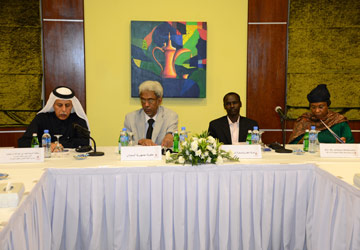Sudan and Darfur rebels agree on agenda for peace talks
January 24, 2013 (KHARTOUM) – The Sudanese government and a rebel faction of the Justice and Equality Movement (JEM) have agreed on an agenda to negotiate a peace deal, an international official told the UN Security Council (UNSC).

He told the 15-member council that the Sudanese government and a JEM faction led by Mohamed Bashar were expected to sign “a framework agenda that would set the parameters for negotiations on the Doha Document for Peace in Darfur” (DDPD).
Nahar Osman, a political adviser of the rebel group, told government-linked media outlet SMC that the two parties had signed the framework agenda for an agreement and will start negotiations in line with a timetable the mediation will set out.
He further stressed the agenda they had proposed is not inconsistent with the provisions of the DDPD in terms of power and wealth-sharing, compensation, return of displaced persons (IDPs) and refugees, as well as justice and security arrangements.
The parties signed a cessation of hostilities and goodwill agreement in October 2012, however mediation efforts failed to bring them together in the past due to their disagreement on a framework for negotiations.
The Sudanese government said the talks should be limited to power-sharing and security arrangements, while the rebel group asked to open the DDPD entirely for discussion.
The group’s leader, Mohamed Bashar, told Sudan Tribune last year they wanted to review the seven chapters of the framework document to add guarantees to ensure its implementation by the Sudanese government.
He pointed out that provisions for justice and compensations are not yet implemented, while IDPs and refugees remain unable to return and militia attacks on civilians continue in Darfur, he added.
Mulet urged the international community to support the ongoing process in Doha “so that all parties, including the Government of Sudan, the Regional Authority of Darfur and armed movements – both inside and outside the peace process – remained focused on the necessity of arriving at a peaceful settlement of the conflict.”
The signing ceremony was attended by the Qatari cabinet affairs state minister Ahmed bin Abdullah Al-Mahmoud; Sudanese state minister Amin Osman Omer, and the deputy joint chief mediator, Aichatou Mindaoudou Souleymane, who plays an active role in the process.
Endorsed by the All Darfur Stakeholders Conference held in the Qatari capital in May 2011, the DDPD was signed by the Sudanese government and the former rebel Liberation and Justice Movement (LJM) in July 2011.
UNSC president for January Ambassador Masood Khan of Pakistan told reporters following the meeting that some council members had expressed concern at the DDPD’s slow implementation, as well as the lack of funding.
The activities of non-security movements, safety and security of UNAMID personnel and the question of visas were also among the issues which came under discussion.
For his part, Sudanese Ambassador Daffa-Alla Elhag Ali Osman said the recent violence in the region was mainly caused by tribal fighting, stressing it “had confirmed that the root causes of the Darfur conflict had concerned land and would persist given the competition over resources”.
He further urged the UNSC to dissociate itself from rebel groups “in Sudan and Darfur, and anyone who rejected the Darfur Document” or continued to hamper international efforts to end conflict.
Osman accused South Sudan and Uganda of supporting and harbouring rebel groups and asked the UNSC to hold both countries responsible for placing obstacles in the path to lasting peace in Darfur.
(ST)

